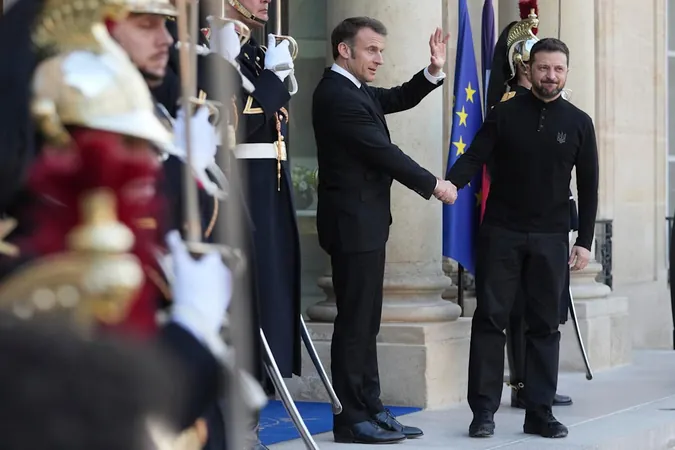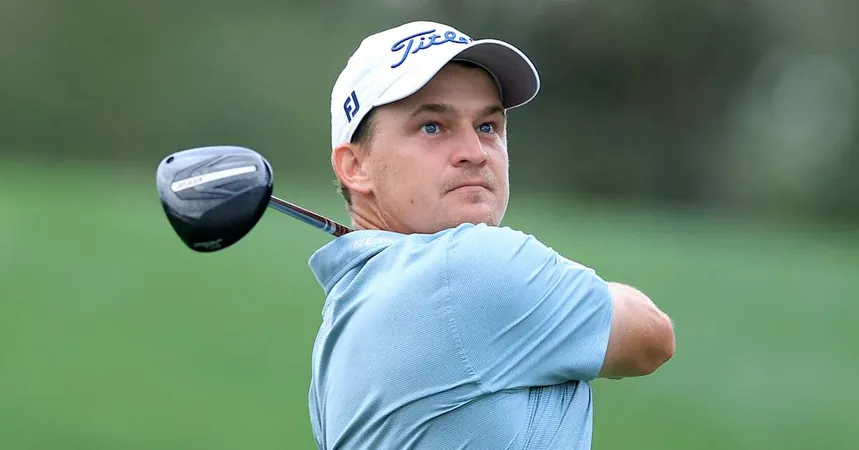
Macron Proposes European Armed Force to Deter Russian Aggression in Ukraine
2025-03-26
Author: Ying
Macron's Initiative for European Armed Force
In a bold statement made on Wednesday, French President Emmanuel Macron outlined the potential for a new European armed force aimed at bolstering Ukraine’s defenses against Russian aggression. Speaking following talks with Ukrainian President Volodymyr Zelenskyy, Macron asserted that this proposed force could "respond" if Russia were to launch new attacks, signaling a pivotal shift in Europe's military posture.
Discussions Ahead of Summit
The discussions come on the eve of a crucial summit in Paris, where representatives from around 30 nations will delve into plans for this European force. Macron proposed that the troops could be stationed in key Ukrainian towns, enabling them to act as a deterrent against further Russian incursions. “If there was again a generalized aggression against Ukrainian soil, these armies would be under attack,” he explained, emphasizing that any aggression initiated by Russia would trigger a response under the established military command framework.
Building a Coalition for Support
Macron is championing this initiative alongside U.K. Prime Minister Keir Starmer, working to galvanize a coalition of countries willing to support Ukraine militarily. The goal is clear: create a formidable presence that discourages Russia from future offensives and fosters a climate conducive to lasting peace.
Clarifying the Role of European Forces
Importantly, Macron clarified that the proposed European forces would not be immediately deployed to the frontlines. Instead, they would function as a stabilizing presence intended to prevent further conflict and uphold a supportive stance from various European governments. "We don’t go to fight; we are there to guarantee a lasting peace. The only ones who would trigger a conflict are the Russians if they decide to launch aggression again," he stressed.
Concerns About U.S. Involvement
This summit is significant not only for its scale, with 31 delegations attending, but also as a reflection of growing international resolve to explore joint military action in Ukraine. However, the absence of the United States looms large over these discussions. The Trump administration has shown hesitancy in endorsing NATO's enhanced military support for Ukraine, with officials expressing doubts about the necessity and potential effectiveness of a European deployment.
A Unified European Response
Contrastingly, European leaders are united in their belief that Russian President Vladimir Putin's aggressive actions—including the annexation of Crimea in 2014 and the ongoing war launched in February 2022—underscore the need for a robust military deterrent in Ukraine.
Training Ukrainian Forces
In addition to the military deterrence, both Macron and Zelenskyy envision that foreign troops could play a critical role in training Ukrainian forces. Ukrainian military efforts have already received backing from international allies, preparing over 75,000 troops to confront the ongoing threat from Russia. Zelenskyy mentioned, “Any contingent consists of combat units primarily, but they will also focus on monitoring the situation, conducting joint training, and preventing the resurgence of Russian aggression.”
Emphasizing Ukraine's Defensive Role
As these discussions progress, European officials are emphasizing that Ukraine's own military would remain the first line of defense against future Russian hostilities, coinciding with a broader strategy to enhance Ukraine’s military capabilities. The 27-nation European Union is committed to a "porcupine strategy," aimed at fortifying Ukraine’s defense industry and armed forces.
New Aid Package Unveiled
During the summit, Macron unveiled a substantial new aid package for Ukraine, valued at 2 billion euros (about $2.15 billion). This includes essential military equipment such as light tanks, air defense systems, and anti-tank missiles, further demonstrating Europe's commitment to supporting Ukraine amidst ongoing hostilities.
Potential Coalition Force Deployments
The deliberations also involve potential deployments of coalition forces in various regions of Ukraine. Reports indicate discussions regarding a significant force presence in central Ukraine, alongside options for possible deployments further from the frontline or even in neighboring countries.
Shift in Military Strategy
As European nations cautiously rebuild their military capabilities following decades of reduction after the Cold War, the commitment of between 10,000 to 30,000 troops for any consideration of a ground force in Ukraine marks a significant shift.
Looking Ahead
As the situation develops, all eyes will be on the international community's next steps in supporting Ukraine and countering Russia's ambitions in Eastern Europe.



 Brasil (PT)
Brasil (PT)
 Canada (EN)
Canada (EN)
 Chile (ES)
Chile (ES)
 Česko (CS)
Česko (CS)
 대한민국 (KO)
대한민국 (KO)
 España (ES)
España (ES)
 France (FR)
France (FR)
 Hong Kong (EN)
Hong Kong (EN)
 Italia (IT)
Italia (IT)
 日本 (JA)
日本 (JA)
 Magyarország (HU)
Magyarország (HU)
 Norge (NO)
Norge (NO)
 Polska (PL)
Polska (PL)
 Schweiz (DE)
Schweiz (DE)
 Singapore (EN)
Singapore (EN)
 Sverige (SV)
Sverige (SV)
 Suomi (FI)
Suomi (FI)
 Türkiye (TR)
Türkiye (TR)
 الإمارات العربية المتحدة (AR)
الإمارات العربية المتحدة (AR)